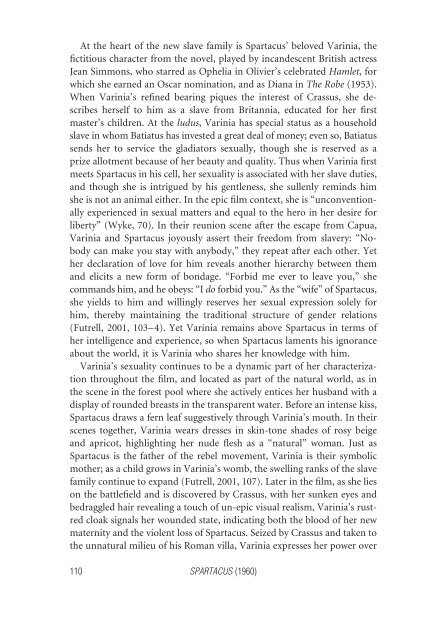Big Screen Rome - Amazon Web Services
Big Screen Rome - Amazon Web Services
Big Screen Rome - Amazon Web Services
You also want an ePaper? Increase the reach of your titles
YUMPU automatically turns print PDFs into web optimized ePapers that Google loves.
At the heart of the new slave family is Spartacus’ beloved Varinia, the<br />
fictitious character from the novel, played by incandescent British actress<br />
Jean Simmons, who starred as Ophelia in Olivier’s celebrated Hamlet, for<br />
which she earned an Oscar nomination, and as Diana in The Robe (1953).<br />
When Varinia’s refined bearing piques the interest of Crassus, she describes<br />
herself to him as a slave from Britannia, educated for her first<br />
master’s children. At the ludus, Varinia has special status as a household<br />
slave in whom Batiatus has invested a great deal of money; even so, Batiatus<br />
sends her to service the gladiators sexually, though she is reserved as a<br />
prize allotment because of her beauty and quality. Thus when Varinia first<br />
meets Spartacus in his cell, her sexuality is associated with her slave duties,<br />
and though she is intrigued by his gentleness, she sullenly reminds him<br />
she is not an animal either. In the epic film context, she is “unconventionally<br />
experienced in sexual matters and equal to the hero in her desire for<br />
liberty” (Wyke, 70). In their reunion scene after the escape from Capua,<br />
Varinia and Spartacus joyously assert their freedom from slavery: “Nobody<br />
can make you stay with anybody,” they repeat after each other. Yet<br />
her declaration of love for him reveals another hierarchy between them<br />
and elicits a new form of bondage. “Forbid me ever to leave you,” she<br />
commands him, and he obeys: “I do forbid you.” As the “wife” of Spartacus,<br />
she yields to him and willingly reserves her sexual expression solely for<br />
him, thereby maintaining the traditional structure of gender relations<br />
(Futrell, 2001, 103–4). Yet Varinia remains above Spartacus in terms of<br />
her intelligence and experience, so when Spartacus laments his ignorance<br />
about the world, it is Varinia who shares her knowledge with him.<br />
Varinia’s sexuality continues to be a dynamic part of her characterization<br />
throughout the film, and located as part of the natural world, as in<br />
the scene in the forest pool where she actively entices her husband with a<br />
display of rounded breasts in the transparent water. Before an intense kiss,<br />
Spartacus draws a fern leaf suggestively through Varinia’s mouth. In their<br />
scenes together, Varinia wears dresses in skin-tone shades of rosy beige<br />
and apricot, highlighting her nude flesh as a “natural” woman. Just as<br />
Spartacus is the father of the rebel movement, Varinia is their symbolic<br />
mother; as a child grows in Varinia’s womb, the swelling ranks of the slave<br />
family continue to expand (Futrell, 2001, 107). Later in the film, as she lies<br />
on the battlefield and is discovered by Crassus, with her sunken eyes and<br />
bedraggled hair revealing a touch of un-epic visual realism, Varinia’s rustred<br />
cloak signals her wounded state, indicating both the blood of her new<br />
maternity and the violent loss of Spartacus. Seized by Crassus and taken to<br />
the unnatural milieu of his Roman villa, Varinia expresses her power over<br />
110 SPARTACUS (1960)



